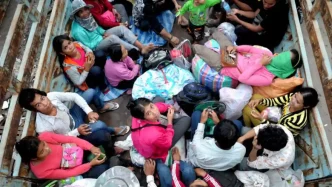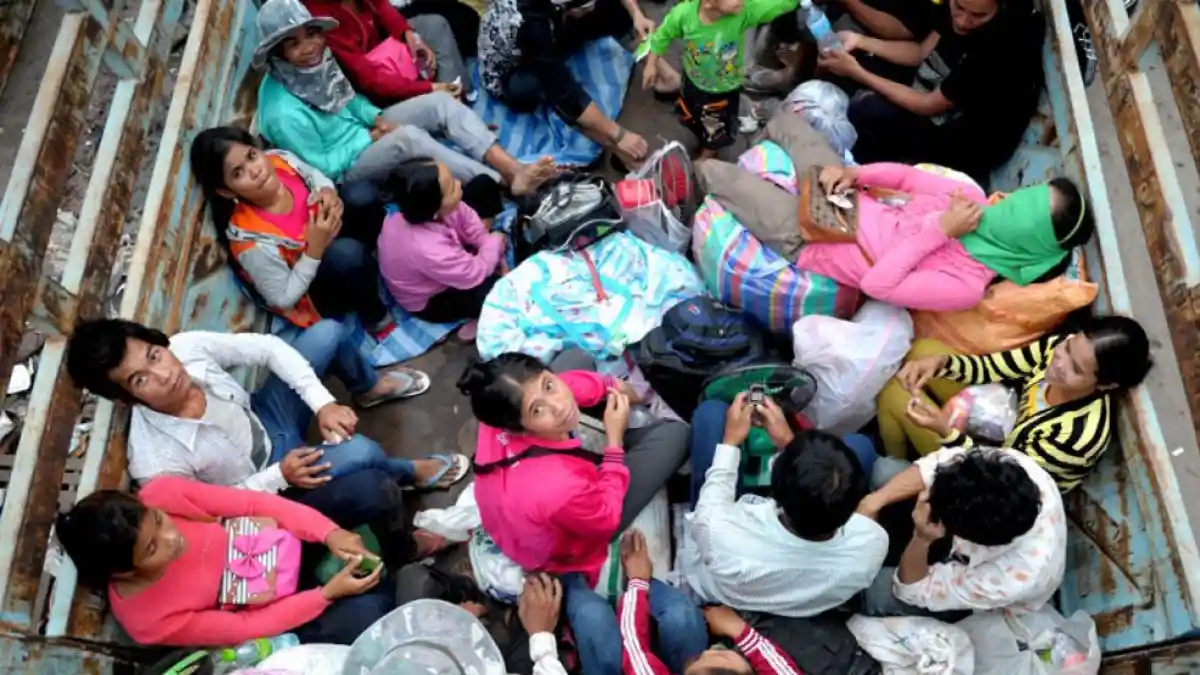In a disturbing development, Filipino authorities have uncovered a new human trafficking route, with victims being lured to Pakistan under the guise of legitimate employment, only to be exploited in illegal online gaming operations. The Bureau of Immigration (BI) in the Philippines intercepted four individuals at Ninoy Aquino International Airport (NAIA) on Sunday, revealing what officials describe as a dangerous shift in trafficking patterns. This emerging trend, linked to the notorious Philippine offshore gaming operators (Pogos), highlights the evolving tactics of criminal networks preying on vulnerable Filipinos seeking better opportunities abroad.
A New Destination for Exploitation
The four alleged victims—a man and three women in their late 30s to early 40s—were apprehended as they prepared to board Cebu Pacific Flight 5J 110 at NAIA Terminal 3, ostensibly headed for Hong Kong. Initially, they claimed to be traveling for a vacation, but under more intensive questioning by immigration officers, they admitted their true destination was Pakistan. According to their statements, one was to work as a cook, while the others were slated to serve as cleaners in an online gaming compound. They revealed they had been recruited by a Chinese individual who promised monthly salaries ranging from 35,000 Philippine Pesos to 45,000 Philippine Pesos (~US$620 to US$800), a significant sum for many Filipinos struggling to make ends meet.
Immigration Commissioner Joel Anthony Viado expressed alarm at the deception involved in this case. “These people were promised jobs, but were told to lie about their purpose of travel and wait for further instructions overseas. This modus operandi reeks of exploitation and abuse,” he stated in a BI release on Monday, July 7, 2025. The victims were provided with cash to support their travel and instructed to pose as tourists, a common tactic used by traffickers to evade detection at borders.
The BI has since referred the case to the Inter-Agency Council Against Trafficking (IACAT) for a deeper investigation into the recruiters and the broader network behind this scheme. Viado urged Filipinos to exercise caution when considering overseas job offers, particularly those that seem overly lucrative or require deception. “Be cautious of anyone offering too-good-to-be-true opportunities abroad, especially if you’re instructed to lie or pose as a tourist,” he warned. “These victims were scammed, and almost trafficked out of the country under false promises.”
A Growing Pattern of Deception
This incident is not an isolated one but part of a broader, troubling trend of human trafficking affecting Filipinos. The government has been grappling with reports of citizens being lured to various countries across Southeast Asia and beyond, often under the pretense of legitimate employment. In recent years, the BI has exposed a range of trafficking schemes, from fake pilgrimages to mail-order bride arrangements and illegal surrogacy operations. The agency reported referring over 990 suspected trafficking victims to IACAT in 2024 alone, underscoring the scale of the problem.
The connection to illegal online gaming operations, particularly those resembling Pogos, adds a layer of complexity to this issue. Pogos, which have been a contentious issue in the Philippines due to their links to organized crime and human trafficking, were largely shut down or driven underground following a government crackdown. However, as Viado noted, the trafficking of Filipinos to Pakistan for similar illicit work suggests that criminal syndicates are adapting, finding new destinations and methods to exploit vulnerable individuals. “This is a deeply disturbing trend. We are now seeing victims being funneled to Pakistan for illegal online work—clearly a new scheme from the same criminal playbook tied to illegal Pogos,” he said.
Historical Context: A Regional Crisis
The plight of Filipino workers being trafficked abroad for exploitative jobs is not new, though the destinations and methods continue to evolve. During a Senate hearing in November 2022, Senator Risa Hontiveros brought attention to the case of a man identified only as “Paulo,” who recounted being illegally recruited for what he believed was a telemarketing job in Mae Sot, Thailand. Instead, he was coerced into working for a crypto-scamming operation in Myanmar. That same month, Hontiveros delivered a privilege speech highlighting the ordeal of 12 other Filipino workers who were promised legitimate employment in Thailand but ended up as crypto scammers in Myanmar.
Further investigations into these schemes prompted Justice Secretary Jesus Crispin Remulla to order a probe into reports of Filipinos being recruited for crypto-scamming jobs in Myanmar in December 2022. By January 2023, another trafficking victim, identified only as “Ron,” testified at a Senate hearing about being forced to work for a cryptocurrency scamming firm in Cambodia after responding to a deceptive job offer posted on social media. These cases reveal a recurring pattern: vulnerable Filipinos, often desperate for better-paying jobs, are targeted with false promises and trafficked across borders into exploitative and sometimes dangerous conditions.
The Broader Implications
The emergence of Pakistan as a destination for trafficked Filipino workers raises significant concerns about the global reach of these criminal networks. While Southeast Asian countries like Myanmar, Thailand, and Cambodia have long been hubs for such activities, the shift to South Asia indicates that traffickers are expanding their operations, likely in response to increased scrutiny and enforcement in traditional hotspots. This development also underscores the adaptability of these syndicates, which appear to exploit geopolitical and economic vulnerabilities in new regions to establish their operations.
For the Philippines, this situation poses both a humanitarian and a diplomatic challenge. The government must not only protect its citizens from falling prey to these schemes but also collaborate with international partners to dismantle the networks responsible. The BI’s swift action in intercepting the four individuals at NAIA demonstrates a commitment to curbing trafficking, but the scale of the problem suggests that much more needs to be done. Public awareness campaigns, stricter regulations on overseas recruitment agencies, and enhanced border controls are critical steps in addressing this crisis.
Economic Desperation as a Driving Factor
At the heart of this issue lies the economic desperation that drives many Filipinos to seek opportunities abroad, often at great personal risk. The Philippines has long been a major source of overseas labor, with millions of its citizens working in countries across the globe as domestic helpers, nurses, construction workers, and more. Remittances from these overseas Filipino workers (OFWs) are a cornerstone of the national economy, contributing billions of dollars annually. However, the promise of high-paying jobs can sometimes blind individuals to the dangers of unregulated or illicit employment offers.
The salaries promised to the four intercepted individuals—ranging from 35,000 to 45,000 Philippine Pesos monthly (~US$620 to US$800)—are far above the average wage for similar roles within the Philippines. For many, such offers represent a chance to escape poverty, support families, or pay off debts. Yet, as this case illustrates, these promises often mask exploitative conditions, with victims finding themselves trapped in situations of forced labor, unable to return home or seek help.
Looking Ahead: Challenges and Solutions
The discovery of this new trafficking route to Pakistan is a stark reminder of the persistent and evolving nature of human trafficking. As criminal networks adapt to law enforcement efforts, authorities in the Philippines and beyond must remain vigilant, sharing intelligence and resources to disrupt these operations. For Filipinos, the message from the BI is clear: skepticism toward overly attractive job offers, especially those requiring deception, is essential for personal safety.
Moreover, addressing the root causes of trafficking—economic inequality, lack of local job opportunities, and inadequate protections for migrant workers—will require long-term policy interventions. Until such systemic issues are tackled, vulnerable individuals will continue to be targeted by traffickers promising a better life that turns into a nightmare. As the investigation into this latest case unfolds, the hope is that it will lead to the dismantling of yet another exploitative network, offering justice to those who have been deceived and exploited.
As the Philippines grapples with this new frontier of human trafficking, the resilience of its people and the determination of its authorities will be tested. The question remains: can regional and international cooperation keep pace with the ingenuity of these criminal enterprises?
















